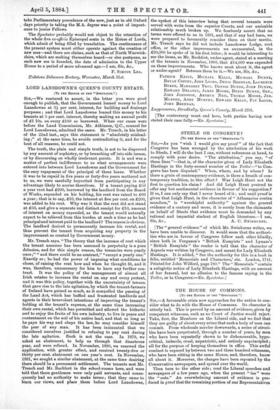LORD LANSDOWNE'S QUEEN'S COUNTY ESTATE.
TO THE EDITOR OF THE " SPECTATOR." _I SIR,—We ventured to assert, in the letter you were good enough to publish, that the Government loaned money to Lord Lansdowne at 3i per cent. interest, for building and drainage purposes ; and that Lord Lansdowne loaned this money to his tenants at 5 per cent, interest, thereby making an annual profit of 21 10s. on every £100 so borrowed. When our cases were before the Land Commission, Mr. Atkinson, Q.C., counsel for Lord Lansdowne, admitted the same. Mr. Trench, in his letter -of the 22nd inst., says this statement is "absolutely mislead- ing ;" at the same time, he avoids contradicting it, and for the best of all reasons, he could not.
The truth, the plain and simple truth, is not to be disproved by any amount of sophistry, or by branching off into side issues, -or by discoursing on wholly irrelevant points. It is and was a matter of perfect indifference to us what arrangements were 'entered into between Lord Lansdowne and the Government for -the easy repayment of the principal of these loans. Whether it was to be repaid in five years or forty-five years mattered not to us, we were carefully boycotted from participating in any advantage likely to accrue therefrom. If a tenant paying £50 a year rent had £200, borrowed by the landlord from the Board -of Works, expended on his bolding, his rent was raised to £60 a year; that is to say, £10, the interest at five per cent. on £200, -was added to his rent. Why was it that the rent did not stand a £50, and give a separate and distinct receipt for £10, amount -of interest on money expended, as the tenant would naturally expect to be relieved from this burden at such a time as he had principal and interest paid to the landlord P The reason is obvious. The landlord desired to permanently increase his rental, and -thus prevent the tenant from acquiring any property in the improvement so created by Government money.
Mr. Trench says, "The theory that the increase of rent which the tenant assumes has been assumed in perpetuity is a pure delusion, and for this simple reason, the tenancies were yearly -ones ;" "and there could be no cantract," "except a yearly one." Exactly so ; he had the power of imposing what conditions he -chose, of raising the rent how and when he thought fit, and it was, therefore, unnecessary for him to have any further con- tract. It was the policy of the management of almost all Irish estates to increase the rental on any and every pretext, and it was this policy, together with the uncertainty of tenure,. that gave rise to the late agitation, by which the tenant-farmers of Ireland have gained so much, as it compelled the passing of the Land Act, which has baffled and frustrated landlords and agents in their benevolent intentions of improving the tenant's holding at the tenant's expense, at the same time increasing their own rental, which has permitted and allowed the hitherto serf to enjoy the fruits of his own industry, to live in peace and contentment on the soil of his native land, and that so long as he pays his way and obeys the law, he may consider himself the peer of any man. It has been insinuated that we considered ourselves justified in refusing ta pay rent daring the late agitation. Such is not the case. In 1879, we asked an abatement, to help us through that disastrous year, and were refused. In November, 1880, we renewed the application, with greater effect, and received twenty-five or
thirty per cent. abatement on one year's rent. In November, .1881, we sought a similar abatement, at the same time desiring there should be a permanent settlement. The tenants met Mr.
'Trench and Mr. Rochfort in the school-rooms here, and were told that these gentlemen were only paid servants, and conse- quently had no authority to make terms; that they came to learn our views, and place _them before Lord Lansdowne, the upshot of this interview being that several tenants were served with writs from the superior Courts, and our amicable relationship much broken up. We fearlessly assert that no terms were offered to us in 1881, and that if any had been, we were prepared to favourably consider them on their merits. Mr. Trench says he did not include Lansdowne Lodge, rent office, or the other improvements we enumerated, in the 220,300 he spoke of in his first letter; it would be interesting to see the items, as Mr. Rochfort, under-agent, stated at a meeting of the tenants in November, 1880, that £14,000 was expended on these improvements. Who knows most about it, the agent or under-agent? Between them be it.—We are, Sir, &c.,
PATRICK KELLY, MICHAEL KELLY, MICHAEL DUNNE, BRYAN COFFEY, JOHN LYONS, DENTS BRENNAN, LAURENCE BYRNE, MARGARET TROY, DENNIS DUNNE, JOHN DUNNE, EDWARD DELANEY, JAMES MOORE, DENIS DUNNE, SEN.,. JOHN JOHNSTON, ARTHUR NEIL, THOMAS MOORE, Jan. MURPHY, ANDY MURPHY, EDWAB.D KELLY, PAT LALOR, JOHN BRENNAN,
Luggacurren, Stradbally, Queen's County, March 27th.
[The controversy must end here, both parties having now stated their case fully.—En. Spectator.]














































 Previous page
Previous page